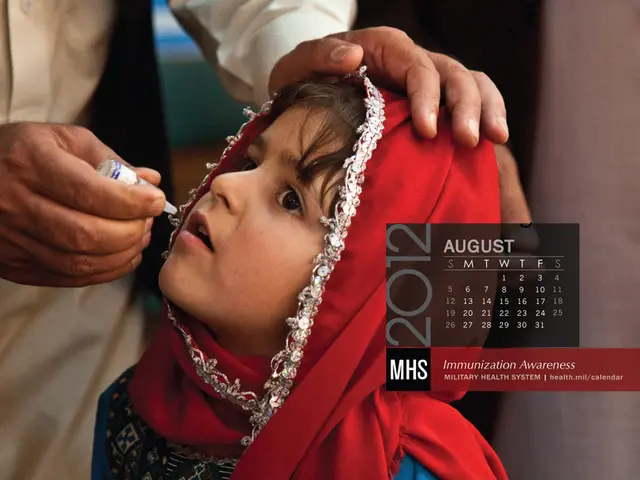Intensified Israel-Palestine Conflict: Over 125 Palestinian Children Among the Dead in Israeli Attacks on Gaza Strip
Laying Waste: Israel's Air Strikes Claim Over a Hundred Lives in Gaza
In a chilling display of force, the Israeli military has mourned over 125 Palestinians, including children huddled in tents, as they unleashed a relentless wave of air strikes across the Gaza Strip on the stillness of Sunday morning.
The bloodshed began in the early hours, with at least 36 casualties and over 100 wounded after Israeli warplanes ruthlessly bombed a tent camp offering refuge to displaced Palestinians in the al-Mawasi area of Khan Younis, southern Gaza. Medical sources recounted this harrowing scene to Al Jazeera.
Brutal footage from the desolate scene shows numerous lifeless bodies, some engulfed in flames. The victims were rushed to a nearby field hospital and the Nasser Medical Complex.
The death toll has surged dramatically in the preceding four days, with hundreds slaughtered as Israel readies to intensify its ground invasion of Palestinian territory under the watch of international scrutiny.
Hamas swiftly denounced these attacks on the vulnerable Palestinians in Khan Younis as a "brutal crime" flagrantly violating international laws and ethics. In a striking statement, they pointed the finger at the United States administration for providing political and military support, thereby directly responsible for this savage escalation of violence against innocent civilians, including children, women, and the elderly.
UN Secretary General Antonio Guterres has reprimanded Israel's broadening operation in Gaza. "I am deeply alarmed by looming plans by Israel to augment ground operations," he declared.
On Saturday, both Israel and Hamas acknowledged that negotiations were underway in Qatar. Despite this, Israel has maintained that these negotiations bear no conditions, including granting access to much-needed humanitarian aid to the Gaza Strip, which has been completely blocked since March 2—a potential precursor to a looming famine.
Israel's far-right National Security Minister Itamar Ben-Gvir has advised Prime Minister Benjamin Netanyahu to withdraw the negotiation team from Doha talks and abstain from striking any deal with Hamas.
Moreover, the Israeli military has persistently targeted hospitals throughout the enclave. Just days ago, the Indonesian Hospital in northern Gaza was laid under siege by Israeli forces since dawn. This siege has caused panic, confusion, and hindrances in the delivery of care and minimal remaining resources, further burdening the already stretched medical staff.
We invite you to sign up for Al Jazeera and stay informed on breaking news developments.
Recommended Stories
- The Human Toll: A Closer Look at the Casualties in Gaza
- The Long and Winding Road: Diplomatic Efforts to Broker Peace
- The Road Ahead: How the West Can Assist in Managing the Crisis
Enrichment Data:
Overall:Here are some essential aspects to consider regarding the recent developments, mediated talks, and international responses to Israeli military actions in Gaza:
Humanitarian Crisis and Civilian Casualties
- Gaza European Hospital Strike: On May 13, 2025, an Israeli airstrike hit the Gaza European Hospital, leaving 28 fatalities and over 40 injuries. The incident caused substantial damage to the hospital's entrance and infrastructure, eventually leading to its evacuation.
- Indonesian Hospital Siege: On May 1, 2025, the Israeli army surrounded the Indonesian Hospital in northern Gaza, causing panic and confusion among patients, the wounded, and medical staff, and consequently disrupting medical care with limited resources available.
Ongoing Diplomacy
Despite limited information on current mediation talks, international efforts have historically concentrated on facilitating de-escalation, humanitarian relief, and fostering dialogue between Israel and Hamas while ensuring safety for civilians.
Community Response and Assistance
The international community widely condemns the attacks and targets via humanitarian aid and calls for ceasefires to prevent further escalation and promote access to affected regions. Organizations such as the UN have expressed concerns about the striking of civilian facilities and the spike in violence in general.
Ultimately, the international community—including the United States and countries like Egypt—has been actively engaged in mediating conflicts, brokering ceasefires, and pushing for dialogue. Moving forward, they will likely maintain a persistent focus on alleviating suffering, upholding human rights, and encouraging a lasting peace agreement.
- The rising death toll in Gaza, with over 125 casualties and hundreds more injured, has sparked global concern about the humanitarian crisis and mental health of those affected by the ongoing war and conflicts.
- In addition to the recent air strikes, the IOF (Israeli Occupation Forces) has also targeted hospitals, as seen in incidents such as the bombing of the Gaza European Hospital, which left 28 dead and 40 injured.
- The impact of the war on health and wellness extends beyond thephysical wounds, as mental health issues have been on the rise due to the escalating violence.
- Despite ongoing negotiations, the future remains uncertain for Gaza's civilian population, with fears of a looming famine and continuing political tensions impacting long-term peace and stability in the region.








